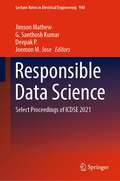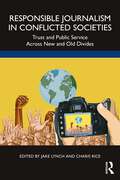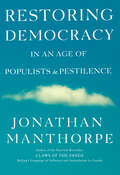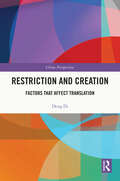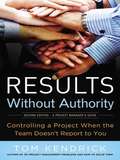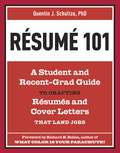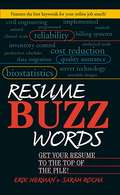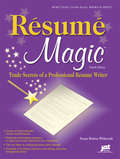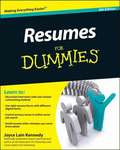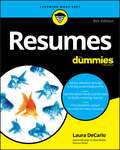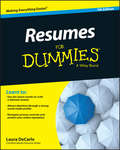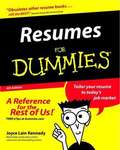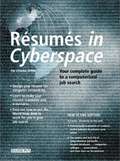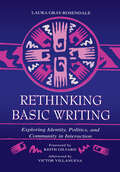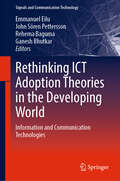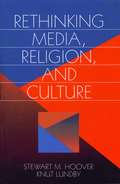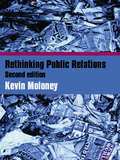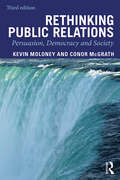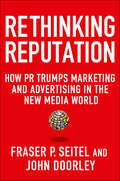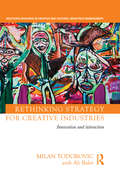- Table View
- List View
Responsible Data Science: Select Proceedings of ICDSE 2021 (Lecture Notes in Electrical Engineering #940)
by Jimson Mathew Joemon M. Jose G. Santhosh Kumar Deepak P.This book comprises select proceedings of the 7th International Conference on Data Science and Engineering (ICDSE 2021). The contents of this book focus on responsible data science. This book tries to integrate research across diverse topics related to data science, such as fairness, trust, ethics, confidentiality, transparency, and accuracy. The chapters in this book represent research from different perspectives that offer novel theoretical implications that span multiple disciplines. The book will serve as a reference resource for researchers and practitioners in academia and industry.
Responsible Journalism in Conflicted Societies: Trust and Public Service Across New and Old Divides
by Charis RiceSetting out multiple perspectives from media and journalism scholars, this collection addresses the implications that today’s technological, socio-political, and economic conditions have for relations between journalists, sources, audiences, and wider publics. Applying an inclusive concept of ‘conflicted societies’ that goes beyond those affected by violent conflict to include traditionally ‘stable’ but increasingly polarised democracies, such as the UK and the USA, contributors engage with longstanding questions and new challenges surrounding concepts of responsibility, trust, public service, and public interest in journalism. The unique span of studies offers international scope, including societies often overlooked in media and journalism studies, such as Northern Ireland, Turkey, Cyprus, Pakistan, The Democratic Republic of Congo, and the Central African Republic. Chapters also feature contemporary case studies, such as the COVID-19 pandemic, as a route into understanding the pertinent issue of fake news, and the ‘local turn’ in journalism. Responsible Journalism in Conflicted Societies is not only a valuable resource for those studying conflict reporting and international journalism but will also appeal to scholars working at the intersection of media, journalism, communication, peace, conflict, and security studies.
Responsive Design High Performance
by Dewald ElsThis book is ideal for developers who have experience in developing websites or possess minor knowledge of how responsive websites work. No experience of high-level website development or performance tweaking is required.
Restless Genius: Barney Kilgore, the Wall Street Journal, and the Invention of Modern Journalism
by Richard J. TofelThe story of the man who transformed The Wall Street Journal and modern mediaIn 1929, Barney Kilgore, fresh from college in small-town Indiana, took a sleepy, near bankrupt New York financial paper—The Wall Street Journal—and turned it into a thriving national newspaper that eventually was worth $5 billion to Rupert Murdoch. Kilgore then invented a national weekly newspaper that was a precursor of many trends we see playing out in journalism now.Tofel brings this story of a little-known pioneer to life using many previously uncollected newspaper writings by Kilgore and a treasure trove of letters between Kilgore and his father, all of which detail the invention of much of what we like best about modern newspapers. By focusing on the man, his journalism, his foresight, and his business acumen, Restless Genius also sheds new light on the Depression and the New Deal.At a time when traditional newspapers are under increasing threat, Barney Kilgore's story offers lessons that need constant retelling.
Restless Multi-Armed Bandit in Opportunistic Scheduling
by Lin Chen Kehao WangThis book provides foundations for the understanding and design of computation-efficient algorithms and protocols for those interactions with environment, i.e., wireless communication systems. The book provides a systematic treatment of the theoretical foundation and algorithmic tools necessarily in the design of computation-efficient algorithms and protocols in stochastic scheduling. The problems addressed in the book are of both fundamental and practical importance. Target readers of the book are researchers and advanced-level engineering students interested in acquiring in-depth knowledge on the topic and on stochastic scheduling and their applications, both from theoretical and engineering perspective.
Restoring Democracy in an Age of Populists and Pestilence
by Jonathan Manthorpe“This global affairs veteran has carved out a solid, mature path, including for ‘flawed democracies’ like the U.S. We’d all be wise to follow.” — Vancouver SunFrom the author of the Claws of the Panda, a Globe and Mail bestseller, Restoring Democracy is quite literally a book for our times. Manthorpe argues that democracy is more resilient than it appears, and is capable of overcoming the attacks from within and without that have sapped its vigour since the end of the Cold War. He begins with a description of the events of 1989, one of the seminal years in modern history. This saw the end of the Cold War, and the apparent conclusive victory of democracy and its civic values. But the view of these changes as a triumph of democracy — as summed up in Francis Fukuyama’s essay "The End of History" — was short-lived. Russia, shorn of its Soviet empire, and the Chinese Communist Party, re-examining its survival after the Tiananmen Square Massacre, began devising ways to counter-attack the West’s triumphalism and these met with considerable success. Internal pressures and contradictions — wealth disparity being chief among them — threaten the survival of many democratic systems. Abandoned industrial workers turn to the repeated platitudes designed to appeal to those left behind without actually offering them the ways and means to catch up. Immigrants, refugees, and the reformist fixations of isolated liberal elites have provided ammunition for would-be despots. Adding to the pressures building on the political norms of our democracies, the COVID-19 pandemic has brought economic and social stand-still for which no country is prepared.
Restriction and Creation: Factors That Affect Translation (ISSN)
by Deng DiThis book presents an overall picture of the constraints faced at different stages of the translation process, providing a more scientific approach to descriptive translation studies.The study investigates translation constraints at three different levels. The micro-system includes the original work, the translator, and the translation itself. The meso-system includes various factors that represent power, such as individuals, groups, and institutions. The book also examines the macro-system, which includes factors related to culture, society, and even the global context. Drawing on the principles of literary hermeneutics, this book advances the study of translation constraints from description to interpretation through systematic analysis. Incorporating the latest scholarship from both national and international sources, the book discusses translation studies when it explores translation constraints and analyses translation constraints when it discusses translation studies.The book will be of interest to scholars and students of translation theory and practice and Chinese studies. It will also be of value to translation professionals.
Results Without Authority: Controlling a Project When the Team Doesn't Report to You
by Tom KendrickFor project managers looking to establish credibility and drive winning results, author Tom Kendrick&’s groundbreaking system provides the key to leading cross-functional, outsourced, and other types of teams through every stage of the project cycle.Results Without Authority is the definitive book on control--teaching the three principal levels of control, including project process, influence, and metrics, among other important areas. You learn the surefire way to keep projects moving forward: by relying only on these factors.The book&’s completely updated second edition includes new information on:agile methods and evolving project management tools,strategies for working with virtual teams,analytical versus &“blink&” decision processes,the use (and misuse) of social media in project environments,and the myth of multitasking.For project leaders lacking clear-cut authority, getting everyone on board--and keeping them there--can be a challenge. Whether you&’re managing small, team-level projects or major organizational initiatives, Results Without Authority is the must-have guide to getting the best outcomes for your company.
Resume 101: A Student and Recent-Grad Guide to Crafting Resumes and Cover Letters that Land Jobs
by Richard N. Bolles Quentin J. SchultzeMinimal job experience? No problem! You've just graduated and are ready to land your first real job after college or high school. But how do you write the first résumé and cover letter of your career if you don't have any previous jobs to list? How do you stand out above the other applicants--including people with more experience who are out of work--with your summer job at the diner, internship at the local paper, or spot on the Ultimate Frisbee team? Dr. Q to the rescue! For two decades, communication professor Quentin Schultze has been teaching résumé-writing to college students and recent graduates, helping them identify their strengths and transferable skills from their unique life experiences--from extracurriculars to part-time jobs to internships to volunteering. With Résumé 101, you'll discover the secrets to composing strong, impressive resumes and cover letters, such as: What to include when you lack professional experience How to get great references and recommendations Why to use a summary rather than objective statement When to include hobbies, travel, and technology skills What to do if your GPA isn't sky-high Which designs and basic formats work the best Where to find the perfect verbs and adjectives for a specific job With Dr. Q's help, you'll soon have a résumé and cover letter that will show hiring managers who you really are, why you're prefect for your dream job, and why they should choose you.
Resume Buzz Words: Get Your Resume to the Top of the Pile!
by Erik Herman Sarah RochaIn today’s ultracompetitive job market, your resume needs the right edge to stand out among a sea of applicants. Using powerful words when crafting your resume can mean the difference between getting the interview and getting left out. Resume Buzz Words offers hundreds of words and phrases that help you rise above the pack and land the hottest jobs. This compact volume offers you: -Buzz words in every career category-from Education and Computers to Real Estate and Retail -600 powerful action verbs that will get your resume to the top of the pile -500 positive adverbs to get you noticed -Dozens of attention-grabbing examples to use in resumes and interviews Meticulously researched to help you find just the right words, this handy book has the power to make you create the buzz!
Resume Magic
by Susan Britton WhitcombAll the tricks professional résumé writers use to create eye-catching, results-driven résumés are revealed in this must-have guide.
Resumes For Dummies
by KennedyWrite a winning resume and land that job interview!Is your job search stalling out after you submit a resume but before you're offered an interview? With a recession that has caused a 10% unemployment rate affecting 15.3 million Americans, having a winning resume is vital to securing an interview-and it demands a fresh look at how you write your resumes and market yourself.Whether you're entering the job market for the first time, looking for a new job after a lay off, or changing careers, Resumes For Dummies shows you the ropes and rules for a new era in recruiting and jobsearching.Instructions for writing an inclusive core resumeTips on targeting a known position, or tailoring a resume to specific industriesCommon resume-writing mistakes to avoidUpdated with the latest information on privacy issues in the electronic age, Resumes For Dummies is your go-to guide for getting your foot in the door.
Resumes For Dummies
by Laura DeCarloPolish up that old resume—and land your dream job We've all been there: it's time to apply for a job or internship and you have to create or revise your resume. Many questions pop in your head. What do employers want? What skills should I highlight? How do I format this? How do I get noticed? But resume writing doesn't have to be a daunting task. The latest edition of Resumes For Dummies answers all of these questions and more—whether you're a resume rookie, looking for new tips, or want to create that eye-catching winning resume. In this trusted guide, Laura DeCarlo decodes the modern culture of resume writing and offers you insider tips on all the best practices that’ll make your skills shine and your resume pop. Let's start writing! Write effective resumes that will stand out in a crowd Understand Applicant Tracking Systems and how to adapt your resume Keep your resume up with the current culture Position a layoff or other career change and challenge with a positive spin Leverage tips and tricks that give your resume visual power In order to put your best foot forward and stand out in a pile of papers, it’s important to have an excellent and effective resume—and now you can.
Resumes For Dummies
by Laura Decarlo<p>Master the art of resume writing and boost your chances of getting hired. <p>With unemployment rates still running high, getting an edge up on the competition in your field—whatever it may be—can be an intimidating and exhausting undertaking. Luckily, <i>Resumes For Dummies</i> is here to serve as your life raft as you navigate the murky waters of a modern-day job search. Inside, you'll find expert guidance on writing a winning resume that will set you head and shoulders above the crowd to land that elusive interview and get the job of your dreams. <p>There's nothing easy and breezy about looking for a new job—whether you currently have one or not. But rather than succumbing to the panic that might convince you to hide under the covers, <i>Resumes For Dummies</i> arms you with the confidence you need to write a resume that will have prospective employers knocking your at your door <p> <li>Includes tips on avoiding common resume-writing mistakes <li>Provides updates on the latest changes in the job market that you'll need to take into account when writing a resume <li>Outlines how to approach a lay-off in a professional light <li>Covers how to confront privacy and reputation issues in online social job search</li> <p> <p>Whether you're a recent graduate, second-timer looking for your next job, prime-timer who hasn't job-searched in decades, or the unfortunate victim of a lay-off, <i>Resumes For Dummies</i> takes the fear out of putting your skills on paper and sets you on the path to getting your foot in the door—and landing the job of your dreams.
Resumes for Dummies (4th Edition)
by Joyce Lain KennedyGet the jump on the competition with the first book that tells you how to create a resume that takes advantage of today's technology. Say goodbye to ugly, plain text formats and welcome the return of the handsome resume - fully formatted and reader friendly. This newly revised guide shows you how to craft a "Standout" resume that'll get your foot in the door.
Resumes in Cyberspace: Your Complete Guide to a Computerized Job Search (2nd edition)
by Pat CriscitoUpdated to help job seekers take full advantage of the latest Internet trends and technology, this new edition provides detailed instruction on designing a resume for computer networking. Readers will learn to make their resumes scannable and searchable through use of key words. They'll also find advice on using the World Wide Web and a variety of commercial online services to land a job. New in this edition is a chapter containing career resources on the web, and instructions for building a network of contacts using e-mail and newsgroups.
Rethinking Basic Writing: Exploring Identity, Politics, and Community in interaction
by Laura Gray-RosendaleThis book surveys the history of basic writing scholarship, suggesting that we cannot adequately theorize the situations of basic writers unless we examine how they construct their own conceptions of their identities, their constructions of their relationships to social forces, and their representations of their relationships to written work. Using a cross-disciplinary analytic model, Gray-Rosendale offers a detailed examination of the oral conversations that take place within one basic writing peer revision group. She explains the ways in which the students' own conversational structures impact and shape their written products. Gray-Rosendale then draws out the potentials of her work for basic writing administrators, curricula builders, and teachers.
Rethinking ICT Adoption Theories in the Developing World: Information and Communication Technologies (Signals and Communication Technology)
by Emmanuel Eilu Ganesh Bhutkar Rehema Baguma John Sören PetterssonThis book provides extended frameworks and models to help with the adoption of information and communication technologies (ICT) in developing countries. The book first discusses the extent to which conventional ICT theories can be rigid in nature, often unable to handle the constant advances in technology, and technology adoption, implementation, usage, and disposal, not to mention different needs and cost availability in developing countries. The authors go on to show how new and revised models, tested in many societies in developing countries, can solve this mismatch. The authors provide examples of successful ICT adoption in developing country settings, in the areas of agriculture, culture, forestry, education, economics, health, and governance. The authors also show how techniques from persuasive design, philosophical designs, and motivational designs have been adjusted to facilitate successful ICT adoption, implementation, usage, and disposal in targeted regions.
Rethinking Media, Religion, and Culture
by Professor Stewart Hoover Professor Knut LundbyThe growing connections between media, culture and religion are increasingly evident in contemporary society, but until now have rarely been theoretically linked. The contributors to this volume effectively combine these areas into a coherent whole. The issues they examine include: the decline of religious institutions during the late twentieth century; the increasing autonomy and individualized practice of religion; and the surge of media and media-based icons that are often imbued with religious qualities, and the ensuing effect on cultural practices.
Rethinking Public Relations: PR Propaganda and Democracy
by Kevin MoloneyAll PR, whether for charities or arms manufacturers, is weak propaganda. Though it has its undeniable benefits (it grabs attention and helps circulate more information), it also has costs (such as selective messaging). This extensively revised edition of a classic text fully investigates PR, updating and expanding earlier arguments and building upon the successful first edition with new thoughts, data and evidence. Thought-provoking and stimulating, Rethinking Public Relations 2nd Edition challenges conventional PR wisdom. It develops the accepted thinking on the most important question facing PR - its relationship with democracy - and finds a balance of advantages and disadvantages which leave a residue of concern. It tackles topical issues such as: PR as a form of propaganda which flourishes in a democracy the connections between PR and journalism the media, promotions culture and persuasion. Designed to appeal to final year undergraduates, postgraduates and researchers studying public relations, media and communications studies, this book explores the most important relationship PR has – the connection with democracy – and asks what benefits or costs it brings to politics, markets and the media.
Rethinking Public Relations: Persuasion, Democracy and Society
by Kevin Moloney Conor McGrathThis new (third) edition of Rethinking Public Relations continues the argument of previous editions that public relations is weak propaganda. However, while earlier editions focused on PR as representative of the uneven power distribution in society, this book goes further, conceiving the power of PR as more than just structural but also as having an important rhetorical component. In this extensively revised edition, Moloney and McGrath dissect the nature of the modern PR industry, arguing that its idealised self-presentation should be replaced by a more realistic and credible defence of the societal value produced by advocacy and counter-advocacy. This book includes expanded coverage of PR’s impact on society (through areas such as CSR, sponsorship and community relations), its relationship with stakeholders, and its role in democratic debate and public policy making. It also considers the ways in which journalism has capitulated to PR in an era of ‘fake news’ and ‘churnalism’ and, in this new edition, the role of digital and social media is examined for the first time. Maintaining the rigorous and critical stance of previous editions, this new edition will also prove accessible to Master’s level and final-year undergraduate students studying public relations, media and communications studies. Additionally, it will be of great value to practitioners who seek to widen PR’s ‘voices’.
Rethinking Reputation: How PR Trumps Marketing and Advertising in the New Media World
by Fraser P. Seitel John DoorleyWhy PR is more important than advertising or marketing - and how to harness its power to get new customers and protect your reputation in today's media-saturated world.Good public relations is no longer just icing--it's a strategic imperative more important to your competitive success than even advertising or marketing. This is true whether you're a century-old multibillion-dollar corporation or a penniless startup. In Rethinking Reputation, public relations guru Fraser Seitel and John Doorley, founder of the Academy for Communication Excellence and Leadership at Johnson & Johnson, examine a fascinating set of case studies--including the BP oil spill and the launch of CitySlips--to glean the PR dos and don'ts for the new media world, covering both standard reputation maintenance and crisis management. They also show start-up companies and entrenched organizations how to use the power of word-of-mouth to jump-start business like never before. This is a wake-up call from two industry legends-for public relations professionals as well as entrepreneurs, CEOs, and anyone else tasked with representing their organization to the world. These new media lessons include: * Remember that research is cheaper, and more critical, than ever. * Don't let the perfect be the enemy of the good--launch your idea before someone else does. * Don't get so excited about social media that you forget about traditional media. * In a crisis, you are never offstage. * Never lie, never whine, and never try to predict the future!
Rethinking Scholarly Communication in China: A Political Economy Approach
by Liu ZhongboThis book examines science and technology policies in China over time and explores the development of scholarly communication through the lens of the political economy of communication.Despite political censorship and restrictions on the production of academic knowledge in China, the number of scholarly publications has skyrocketed over the past 20 years. By explaining these seemingly contradictory phenomena, this study provides insight into the complex landscape of scholarly communication in China, shaped by the government in collaboration with commercial publishers. The book examines the dynamic relationship between the state and the market, including their key players, which determines the production and dissemination of academic knowledge. From a political economy perspective, it investigates how the academic governance complex, a system that intertwines communication, politics, and economics, has been established in China. It then discusses the impact of this system on the production of academic knowledge in the country.The title will serve as a key reference for academics, researchers, and students interested in the intersection of communication studies, librarianship, and political science, particularly those focusing on China's academic knowledge production and scholarly communication.
Rethinking Strategy for Creative Industries: Innovation and Interaction (Routledge Research in Creative and Cultural Industries Management)
by Milan Todorovic with Ali BakirCreative Industry practices are increasingly manifested through hybrid models and methods and emerging sub-sectors. With ever finer dividing lines between form and content, product and service, participation and consumption, the distinctions between sectors are increasingly blurred, while new, convergent models emerge. Reflecting this fluid context, this book provides a new perspective on strategy in the Creative Industries. Based on extensive original research and live empirical data derived from case studies, interviews, and observations with creative managers, it reveals strategic decision-making by analysing business manoeuvres and stages of innovation in the Creative Industries. Through analysing the interactive features of aesthetically driven information assets, and how new user/consumer cultures are applied, it uncovers the principles that are transforming strategy in the Creative Industries. This innovative volume will be of significant interest to scholars, advanced students and practitioners in the Creative Industries as well as well as industry consultancies and practitioners.
Rethinking Translators: Constraints, Affordances, Postures (New Frontiers in Translation Studies)
by Andrea MusumeciThis book introduces a new area of research known as "translator's posture". With technical, pedagogical, and sociological dimension, posture is valuable to learners, researchers, educators, and practitioners alike. The technical dimension aims to invite practitioners and more advanced learners to reflect on their position within translation environments and establish their posture as translators with more ecological awareness. The pedagogical framework is grounded in an original conceptual exploration of translation constraints, leading to an ecologically inspired perspective on translation affordances. The sociological aspect draws on the notion of authorial posture in sociology of literature. The book also presents the action research data collection from a translation theory module in a Hong Kong University, supporting the integration of postural learning into curricula. This book aims to benefit global academic and professional communities in translation studies.
